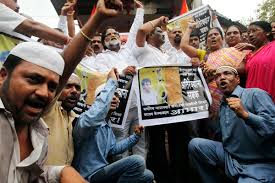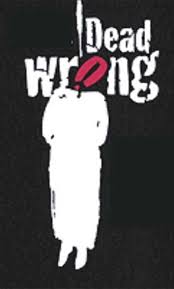 Ever since the arrest of Ajmal Kasab, for his association
with the horrific violence unleashed in the city of Bombay in November 2008,
there has been a media-orchestrated, orgiastic baying of his blood from large
sections of the Indian populace. So deep and profound has this orgy been, that
subsequent to the confirmation by the Supreme Court of India, of the death
penalty awarded to him, there have been demands that this execution be carried out in public. Buoyed by this energy, public spirited citizens have even come
forth offering their services as the hangman.
Ever since the arrest of Ajmal Kasab, for his association
with the horrific violence unleashed in the city of Bombay in November 2008,
there has been a media-orchestrated, orgiastic baying of his blood from large
sections of the Indian populace. So deep and profound has this orgy been, that
subsequent to the confirmation by the Supreme Court of India, of the death
penalty awarded to him, there have been demands that this execution be carried out in public. Buoyed by this energy, public spirited citizens have even come
forth offering their services as the hangman.
 Also present in this melee however, have been the voices of a
stubborn minority that have argued their principled opposition to the death
penalty and persistently argued against the penalty, be it for Ajmal Kasab or
anyone else. The arguments against the death penalty are numerous; one of them
being that it is not for the State (or anyone) to take human life. The theistic
would add that life that has not been given by us, cannot be taken away by us.
Further, is the more pragmatic argument, that given the possibilities of a
variety of factors impacting on the trial and judgment, there is always the
possibility of the wrong person being killed for a crime they did not commit.
Also present in this melee however, have been the voices of a
stubborn minority that have argued their principled opposition to the death
penalty and persistently argued against the penalty, be it for Ajmal Kasab or
anyone else. The arguments against the death penalty are numerous; one of them
being that it is not for the State (or anyone) to take human life. The theistic
would add that life that has not been given by us, cannot be taken away by us.
Further, is the more pragmatic argument, that given the possibilities of a
variety of factors impacting on the trial and judgment, there is always the
possibility of the wrong person being killed for a crime they did not commit.

To these arguments, the fierce response has been that there
can be no doubt that Ajmal Kasab was involved in the violence in Bombay; and
further, who are we to talk, given that we were not the ones to loose family
and loved ones in those terrible days in November 2008. It is in face of the
latter argument that I have invariably fallen silent, for truly, without being
in that position, how do I know what my response would be in a similar
situation? If it were my people that had been butchered, would I not, perhaps,
also have joined in the demand for blood?
 The judgment in the case of Babu Bajrangi and Maya Kodnani in
the Naroda Patiya massacre, associated with the Gujarat pogrom of 2002, seems
to allow the space to finally provide an ethically honest response to this
question that until now invariably silenced me. The Naroda Patiya massacre
involved a mob of Hindu nationalists who mutilated and killed around 97 people.
Leading this mob and encouraging them in acts of extreme violence, acts that
included the disemboweling of a pregnant woman and the spearing of her foetus,
were Maya Kodnani and Babu Bajrangi. A
week ago, Ms. Kodnani was sentenced to 28 years in prison, while Babu Bajrangi
was sentenced to life imprisonment. The death penalty was not awarded to either
these two, or the others convicted along with them.
The judgment in the case of Babu Bajrangi and Maya Kodnani in
the Naroda Patiya massacre, associated with the Gujarat pogrom of 2002, seems
to allow the space to finally provide an ethically honest response to this
question that until now invariably silenced me. The Naroda Patiya massacre
involved a mob of Hindu nationalists who mutilated and killed around 97 people.
Leading this mob and encouraging them in acts of extreme violence, acts that
included the disemboweling of a pregnant woman and the spearing of her foetus,
were Maya Kodnani and Babu Bajrangi. A
week ago, Ms. Kodnani was sentenced to 28 years in prison, while Babu Bajrangi
was sentenced to life imprisonment. The death penalty was not awarded to either
these two, or the others convicted along with them.
 I have no blood-links with the people killed, maimed or
dispossessed in the course of the 2002 Gujarat pogrom. However, like many
others, I have good reason to identify intimately with them. The 2002 pogrom
was not merely a ‘warning’ to Muslims in India, but to all minority (not merely
religious) groups, that this sort of violence could be visited upon them next.
We have seen such violence in Orissa, in Assam, and more recently in South
Kanara. Given that that some of my dearest relatives live in Mangalore, the violence
in Gujarat is not an external event. It marks the approaching drum-beat of a
savagery that could easily mar my own life. Those people in Gujarat could
easily have been my very own. Also, just as the persons baying for Kasab’s
blood are emotionally invested against him and all that he stands for, I too,
am emotionally invested against Kodnani and Bajrangi. And yet, after careful
thinking, I am convinced that I am not in anyway desirous of their blood. I do
wish to see them jailed, and put away for a good period, but I do not wish to
have their blood on my hands.
I have no blood-links with the people killed, maimed or
dispossessed in the course of the 2002 Gujarat pogrom. However, like many
others, I have good reason to identify intimately with them. The 2002 pogrom
was not merely a ‘warning’ to Muslims in India, but to all minority (not merely
religious) groups, that this sort of violence could be visited upon them next.
We have seen such violence in Orissa, in Assam, and more recently in South
Kanara. Given that that some of my dearest relatives live in Mangalore, the violence
in Gujarat is not an external event. It marks the approaching drum-beat of a
savagery that could easily mar my own life. Those people in Gujarat could
easily have been my very own. Also, just as the persons baying for Kasab’s
blood are emotionally invested against him and all that he stands for, I too,
am emotionally invested against Kodnani and Bajrangi. And yet, after careful
thinking, I am convinced that I am not in anyway desirous of their blood. I do
wish to see them jailed, and put away for a good period, but I do not wish to
have their blood on my hands.
 As many of us who have opposed the death penalty have often emphasized,
the issue at stake in the opposition to the death penalty is not about what
happens to persons who have committed a crime heinous enough for us to want
their death. The point is what does instituting, and perpetuating the death
penalty do to us as people, and as a polity. The impact it has should be
obvious to even a casual observer of recent Indian politics, where the death penalty
has become the penalty of choice for practically every offence, ranging from
corrupt practices, to rape. To set ourselves on this path, is for us as a
polity to lose the meaning of the value of human life and to persuade ourselves
that killing is a valid answer for harms done to us. Supporting the death
penalty does not close the cycle of deaths perhaps commenced by the criminals,
it only perpetuates the cycle, trapping the living in a ceaseless cycle of
death.
As many of us who have opposed the death penalty have often emphasized,
the issue at stake in the opposition to the death penalty is not about what
happens to persons who have committed a crime heinous enough for us to want
their death. The point is what does instituting, and perpetuating the death
penalty do to us as people, and as a polity. The impact it has should be
obvious to even a casual observer of recent Indian politics, where the death penalty
has become the penalty of choice for practically every offence, ranging from
corrupt practices, to rape. To set ourselves on this path, is for us as a
polity to lose the meaning of the value of human life and to persuade ourselves
that killing is a valid answer for harms done to us. Supporting the death
penalty does not close the cycle of deaths perhaps commenced by the criminals,
it only perpetuates the cycle, trapping the living in a ceaseless cycle of
death.
 Before concluding, I would like to turn the issue around, and
ask those in favour of the death penalty, why the same death penalty apparently
justified in the case of Kasab, was not afforded to Kodnani and Bajrangi? On
the face of the matter, there should be no doubt that Naroda Patiaya massacre
constitutes a terrorist activity. Further, if one examines the case
objectively, one realizes that the crimes committed by Kasab and his
accomplices, and by Kodnani-Bajrangi, and theirs, in fact partake of a profound
commonality. Both crimes, those in 2008, and those in 2002, were violent crimes
against innocents, robbing them of their life. Furthermore, if one recognizes
that sovereignty in India, as in other republics, stems from the collective of
the people, any attack against the people, is an attack on the sovereignty of
the State. Both crimes were by this logic, and as is popularly agreed in the
case of Kasab, against the people of India, against the sovereignty of the
State. In the Gujarati case, this attack on India’s sovereignty was because it
willfully challenged, not just the rule of law and order of the Indian State,
the host of fundamental rights it guarantees its citizens, but also the ethic
of a secular system that the Indian Constitution is committed to. If Kasab is
held worthy of the death penalty, why not Kodnani and Bajrangi? Do you see how
the demand could go both ways?
Before concluding, I would like to turn the issue around, and
ask those in favour of the death penalty, why the same death penalty apparently
justified in the case of Kasab, was not afforded to Kodnani and Bajrangi? On
the face of the matter, there should be no doubt that Naroda Patiaya massacre
constitutes a terrorist activity. Further, if one examines the case
objectively, one realizes that the crimes committed by Kasab and his
accomplices, and by Kodnani-Bajrangi, and theirs, in fact partake of a profound
commonality. Both crimes, those in 2008, and those in 2002, were violent crimes
against innocents, robbing them of their life. Furthermore, if one recognizes
that sovereignty in India, as in other republics, stems from the collective of
the people, any attack against the people, is an attack on the sovereignty of
the State. Both crimes were by this logic, and as is popularly agreed in the
case of Kasab, against the people of India, against the sovereignty of the
State. In the Gujarati case, this attack on India’s sovereignty was because it
willfully challenged, not just the rule of law and order of the Indian State,
the host of fundamental rights it guarantees its citizens, but also the ethic
of a secular system that the Indian Constitution is committed to. If Kasab is
held worthy of the death penalty, why not Kodnani and Bajrangi? Do you see how
the demand could go both ways?
 The response against the death penalty was provided by the
judge of the special court set up to try these cases, Jyotsna Yagnik. It is
reported that she felt the death penalty “was against “human dignity.”” If then,
the death penalty is against human dignity, and the crimes of Kodnani and
Bajrangi rank on a similar conceptual scale to that of Kasab, should we not
argue, using our principled opposition to the death penalty, that a similar
clemency, and basic respect for a human being be shown to Kasab?
The response against the death penalty was provided by the
judge of the special court set up to try these cases, Jyotsna Yagnik. It is
reported that she felt the death penalty “was against “human dignity.”” If then,
the death penalty is against human dignity, and the crimes of Kodnani and
Bajrangi rank on a similar conceptual scale to that of Kasab, should we not
argue, using our principled opposition to the death penalty, that a similar
clemency, and basic respect for a human being be shown to Kasab?
We would need to show this clemency for Kasab and others
languishing on death row for crimes against the Indian State, because there is
probably a very deep anti-Muslim bias (a bias that simultaneously operates
against a number of similarly marginalized communities, and dissident groups in
India) that is operating behind the sense of justice that accompanies the
demand for capital punishment for them.
We should be grateful that Kodnani and Bajrangi were not
awarded the death sentence, because it offers us the opportunity to halt the
mindless cycle of eye-for-an-eye and tooth-for-a-tooth that India seems
determined to get into. We need to begin this halt of life-taking somewhere,
and it is best that this halt begin with us, those of us who are opposed to the
death penalty, even as we know, that someday, we could be the victims of
murderous violence, by people who quite firmly believe in the death penalty,
for crimes real or imagined, judicially supervised or otherwise.
(A version of this post was first published in the Gomantak Times on 5 Sept 2012)

No comments:
Post a Comment